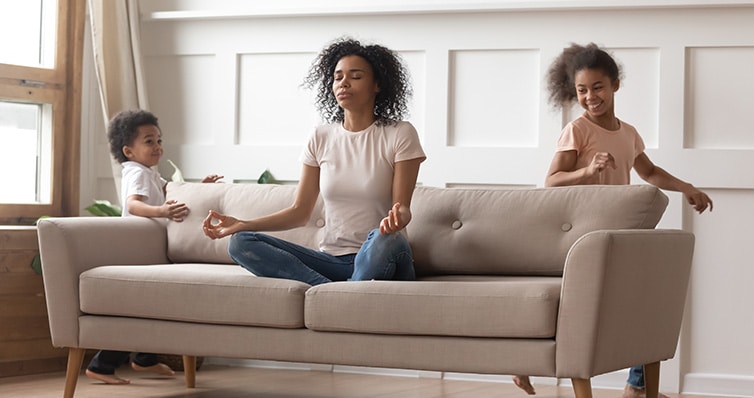Meditation Helps to Accept What We Can’t Change in Our Children
Category: Meditation for Students and Families | Mind Trainer Articles

Creating space for acceptance of our kids improves parenting
There are times in life where we don’t have a choice, which is an incredibly fertile moment for change, for growth, and even for transformation. Because it’s like this: we want to be in control. One of our basic myths, one of our basic drivers, is the idea that we can be in control, and therefore if there seems to be something we don’t like, we can fix it; we can alter it. But you know, that’s not always true. We can debunk this fallacy in meditation.
We may think, “Okay, I’ll grudgingly accept that.” But there’s more to it if we accept that this situation is a growing point for us. How? Because this is where we step outside of a kind of narrowness we’ve been carrying. That’s why I think these are really good points in our lives, the situations where we come up against something we can’t figure out how to resolve with our smarts.
Of course, often these situations are going to be with other humans, and quite often with our children. And this is despite the idea we carry that “What? Didn’t I create these beings? Aren’t they somehow my own work, my own product? And therefore, can’t I fix them when they don’t do what I want them to? When they seem to be going wrong?” No, no, you can’t, because human beings aren’t fixable in that way. They’re not products. They’re living, breathing, somewhat creative and somewhat chaotic humans, and we’re not in charge of them. We don’t control them.
Actually, we don’t control anything—not even ourselves, to be honest. You begin to understand that when you sit and watch your mind through hours of sitting meditation. But we really come up against this with our children, and if we don’t like it, if we can’t learn how to relax with it and to grow through it, we’re going to be very unhappy. And we’re going to transfer our unhappiness to our children because they’re going to know in some way that we’re disappointed in and disapproving of them, and that’s going to cultivate in them a sense of unworthiness. Maybe later on it will become rebellion, they’ll rebel, but they won’t become independent through rebellion of that kind. They’ll just become resentful, and in a way they’ll still be dancing to our tune.
So when we’re up against those points in life where, for instance, our children are different than we wanted them to be or are going to pursue a somewhat different path—say they’re going to be a scientist instead of an artist, they don’t like the same music we like, or whatever it is—I don’t mean just trivial things, but really profound ways in which our children can’t conform to the plan we’ve had for them—we’ve got to learn to relax at that stage. There’s a clear parallel between this and what we practice in meditation when we relax with our thoughts, with our breath, and with our being. We can apply this to our life and our relationship with our children.
And you know what? Two people will grow through that. The child, because the child will then have the permission, in a way, the space to grow and develop his or her own special abilities and his or her own creativity and intelligence; and we’ll grow too because we’ll have realized that actually giving space to our child is the most loving act we can offer them. We’ve given them space to be the person they’re capable of being. And it didn’t kill us. It didn’t hurt us. It didn’t destroy us. We survived. We became somewhat kinder. Somewhat more patient. We’re stronger people, wiser people.
Meditation brings the space of acceptance and wisdom.
I think we grow through these points—and it’s not just in parenting, but in other areas too—where we come up against what seems to be a wall, where reality is saying “You can’t have it any other way. This is the way it’s going to be.” We could kick that wall, but you know what? Only our foot will be hurt. The wall won’t fall down. We’ll simply hurt ourselves and the situation won’t get any better.
Instead, we can find a space of acceptance. It isn’t defeatism, it’s not like, “Oh, it’s kismet and I must just accept the inevitable.” It’s not like that. It’s not a defeat, it’s not a blockage—it’s a real opportunity. We’re learning the textures of life and respecting them. Acceptance of what we can’t change is where we will grow. And there is a door there, you see. In one sense, there’s a wall, but there’s also a door. The door opens onto greater self-awareness, greater acceptance and greater wisdom. When things can’t be changed, let’s open that door in the wall.
Would you like to experience guided meditation for parents? Check out our course on Meditation for Parents. Learn how to be the best parent you can be through meditation practice – includes a special meditation for teens that they’ll love called Whole Body Breathing.
This article is the second in a series by Lama Jampa Thaye on Meditation and Parenting. See the other articles here:
– Parenting as a Meditator – we teach meditation to our children by the genuineness of our own presence.
– Better Parenting Decisions – how meditation help us connect with a sense of space in our minds which gives us confidence to make wise decisions.
– The last article is about helping our kids deal with information technology and social media.






